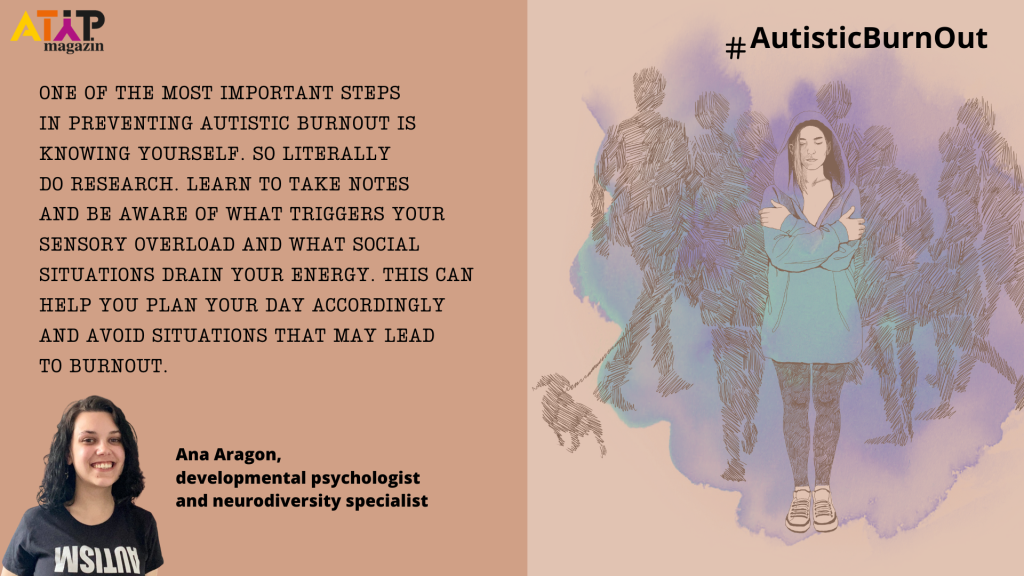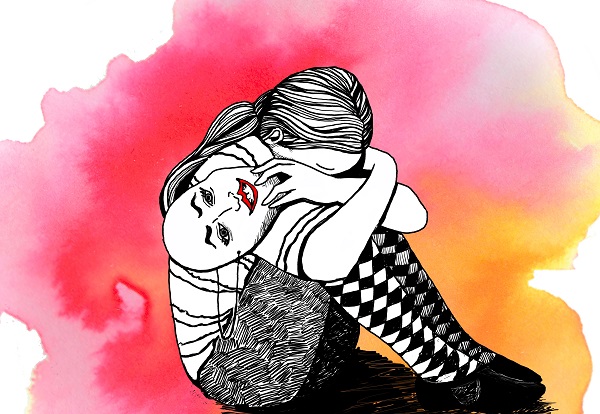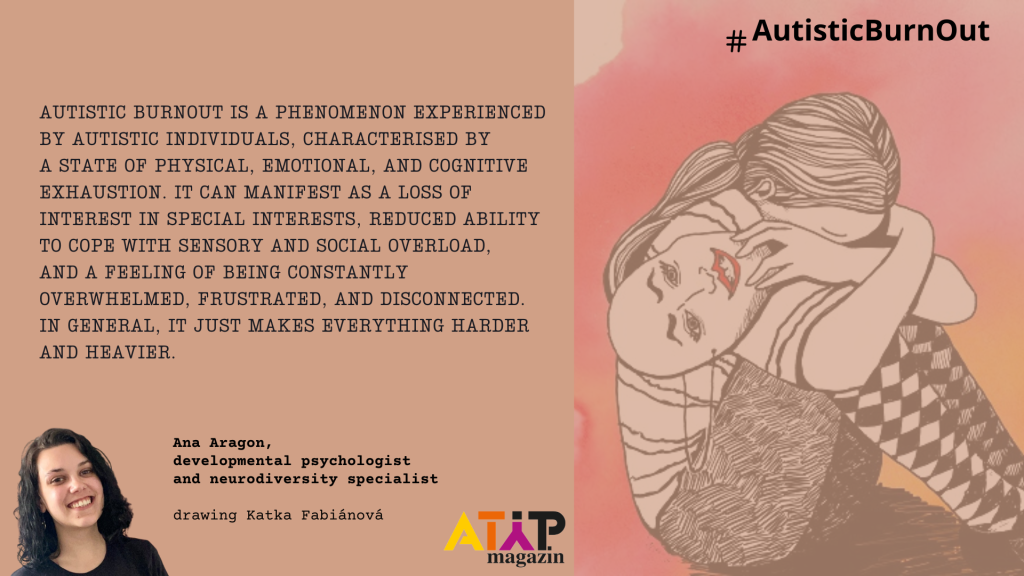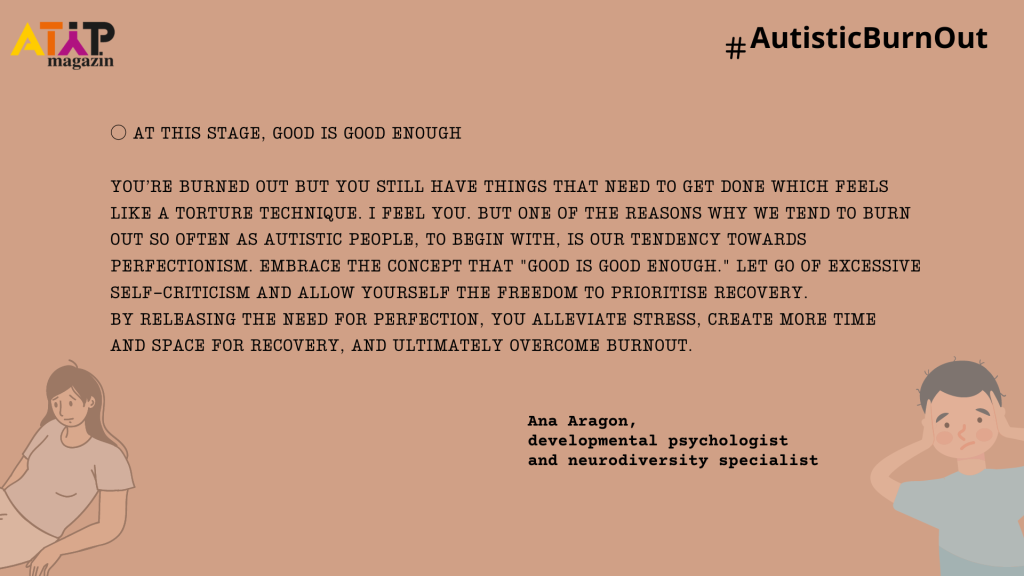British developmental psychologist and neurodiversity specialist Ana Aragon provided to the ATYP Magazine a text focused on autistic burnout. The fact that she was diagnosed at the age of 19 also led her to work with people on the autism spectrum, and as she says, she knew nothing about autism until then. At the time, she was studying at a film school, and after the diagnosis, she realized that film was not what she enjoyed. Today, she utilizes the wealth of knowledge she gathered while working with various autistic people of various ages, as well as her own. Her childhood was complicated, as she says, and people didn’t understand her. She had often heard that she was stupid and socially inept. Today, she helps other neurodiverse people with self-acceptance and understanding that having a different brain doesn’t mean being stupid and socially inept. She tries to teach others not to be defined by the opinions of others. Shee is also working on a book about being in tune with your autistic self. Since 2016, the Czech magazine ATYP has been composed of neurodivergent people, especially people on the autism spectrum.
If you’re an #actuallyautistic person, have you ever wondered what Autistic Burnout is, why it happens, how to try to prevent it, and how to recover from it?
Well, let’s start with what it is, and why it happens!
Autistic Burnout is a phenomenon experienced by autistic individuals, characterised by a state of physical, emotional, and cognitive exhaustion. It can manifest as a loss of interest in special interests, reduced ability to cope with sensory and social overload, and a feeling of being constantly overwhelmed, frustrated, and disconnected. In general, it just makes everything harder and heavier.
What causes autistic burnout?
This mainly happens as a result of two things – prolonged periods of coping with the emands of a neurotypical world, and something called Allostasis.
As humans, in general, our brain constantly tries to take us back to our ‘neutral zone’, this active process is named Homeostasis. Every time we experience pleasure or pain, or any other type of emotion, our brain eventually tips the scale so we can go back to Homeostasis. This is a natural process and an extremely important one, but if for any reason we tilted this emotional and chemical scale for too long (too much change, too much pain or even pleasure), then our brain has a hard time achieving Homeostasis which eventually leads to Allostasis.
Allostasis is useful, but not if it lasts long
Allostasis is an extension of Homeostasis and is defined as the effective control required to have the body ready to meet its needs before they arise by budgeting those necessary resources, this is done by reallocating resources such as oxygen and insulin. Unlike Homeostasis, the goal of Allostasis is not to maintain a steady state but rather to constantly adapt to changing circumstances. So, it’s a useful process really!
However, when we remain in an extended state of Allostasis, it can become difficult to feel neutral and like ourselves again. For us autistic people, this can lead to a state of constant exhaustion – Autistic Burnout. The longer it lasts, the more Autistic Burnout can significantly impair our ability to function in daily life.
But do not worry, there are ways to try to prevent this from happening as much as possible, and ways to help you recover once it does happen so you don’t need to experience it for long periods of time.
All about this in my next post!
Just remember that if you’re currently experiencing Autistic Burnout, the best thing you can do for yourself is taking the pressure off.
Whatever you can do is what you can do!
How to prevent autistic burnout as much as possible
In this text, we’ll explore ways to prevent it as much as we can. But I would like to acknowledge that it’s possible to minimise the risk of autistic burnout to a large extent but not entirely. It will occasionally happen to us all, and that’s okay.
As autistic individuals, we tend to have a natural inclination towards extremes, making it challenging to find moderation and balance. However, recognising when we’re tipping towards an imbalance and taking action to restore our equilibrium is essential.
 So here are some practical ways to try to do this as well as possible:
So here are some practical ways to try to do this as well as possible:
○ Research yourself
One of the most important steps in preventing Autistic Burnout is knowing yourself. So literally do research. Learn to take notes and be aware of what triggers your sensory overload and what social situations drain your energy. This can help you plan your day accordingly and avoid situations that may lead to burnout.
○ Practice Self-Care (yeah, I know, but hear me out)
If you know what things make you feel like yourself again then feeling balanced is just a couple of activities/steps away. Make sure to prioritise activities that relax you. This can include anything from taking a hot bath, going for a walk in nature, or spending time on your special interests. Learn what works for you, be curious about yourself, research!
○ Plan Rest
Activities that help you recharge are crucial, so plan rest, literally. Taking regular breaks is essential in preventing burnout. It’s okay to take a step back and recharge before you desperately need to.
○ Have the 5 ‘essential life pillars’ down
In my experience, there are five key factors that contribute to achieving balance and well-being: Getting good sleep at least 80% of the time; catching some sunlight soon after waking up so you get a cortisol spike in the morning; good nutrition; movement (exercise, yoga/stretching, walks, etc.); and dedicating time to deep connections (to others but especially to yourself). If I’m honest this is the most important point, for me at least.
All this said, we’re all different and that’s why the idea of researching yourself is so important. The more information you have the better you know how to keep yourself balanced and prevent burnout.
I do all of the above daily, but I haven’t posted in a while because I recognised that I was getting close to feeling burnout and so I had to take a step back from LinkedIn and other tasks in order to feel balanced again, and that’s just fine! We will see in the next part of my text, we’ll look into how to recover from Autistic Burnout, at the end of the day it’s inevitable that it happens from time to time, but it can stick around for less time!
Practical ways to recover from autistic burnout
Now, let’s delve into practical ways to recover from it effectively and safely.
○ Schedule time to slow down
Like literally, just slow down. Recovering from Autistic Burnout requires giving yourself the time and space to slow down and recharge. Set aside moments of uninterrupted solitude, free from distractions and screens. Simply be present with yourself, perhaps savouring a cup of tea. This dedicated time will allow your brain to process emotions, release tension, and restore balance. Sometimes this process is a little painful, I’m not going to pretend it’s not, but your brain needs to process these things in order to get out of the Autistic Burnout cycle. We all have a choice: temporary discomfort through slowing down or prolonged suffering by neglecting the need to process our experiences.
○ Have 2 routines
To navigate through burnout, it’s helpful to establish 2 routines. As humans in general, we often plan for the most energetic version of ourselves. However, during Autistic Burnout, our capacity may decrease significantly, and that’s okay. By creating a routine A that includes all desired tasks and a routine B with only the essentials, you can adapt your daily plans based on your energy levels and emotional state. Each day, take a moment to assess how you feel and choose the appropriate routine accordingly. This flexibility will provide structure while accommodating your fluctuating needs.
○ At this stage, good is good enough
You’re burned out but you still have things that need to get done which feels like a torture technique. I feel you. But one of the reasons why we tend to burn out so often as Autistic people, to begin with, is our tendency towards perfectionism. Embrace the concept that “good is good enough.” Let go of excessive self-criticism and allow yourself the freedom to prioritise recovery. By releasing the need for perfection, you alleviate stress, create more time and space for recovery, and ultimately overcome burnout. (I’ll admit I tend to struggle with this one though).
Life is a journey of ups and downs, an eternal spiral. The whole universe follows this pattern, and so do we. Embracing this reality brings me solace during times of burnout, and helps me realise it is only a temporary phase.
This too shall pass.
In the midst of burnout, remember to relax, reclaim your time, and prioritise self-care. You deserve to nurture yourself and restore your well-being. Take care, my fellow Autistic individuals, and may your recovery be swift and rejuvenating!
Be kind to yourself.
__________
text Ana Aragon, MSc, MBPsS / drawing Katka Fabiánová / graphic design ATYP Magazín / (Zdroj: Ana Aragon).











